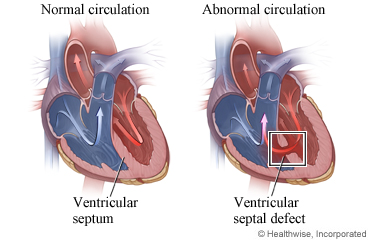
Overview
The heart is a muscular pump that has four chambers. A ventricular septal defect is an opening in the wall between the lower chambers of the heart. It is a type of congenital heart disease, which means that your child was born with it.
When this problem is present, some of the blood may flow from one side of the heart through the opening to the other side. This can make the heart pump too much blood to the lungs and not enough to the rest of the body.
A very small opening may not cause problems. Small openings sometimes close on their own.
A larger hole may damage the lungs and weaken the heart over time. You and your child's doctor can decide if a procedure to close the hole is right for your child.
Follow-up care is a key part of your child's treatment and safety. Be sure to make and go to all appointments, and call your doctor if your child is having problems. It's also a good idea to know your child's test results and keep a list of the medicines your child takes.
How can you care for your infant at home?
- Give your baby medicines exactly as prescribed. Call your doctor if you think your baby is having a problem with a medicine.
- Watch for symptoms that may mean there is a problem. These include fast breathing, sweating while eating, not eating well, and not gaining enough weight.
- Help your baby eat enough. This can be hard for some babies who have a heart problem. They may get tired when eating, so they may eat less and may not get enough calories.
- Note your baby's first signs of hunger, such as fidgeting and sucking on a fist. Your baby will have more energy to eat well if your baby is not tired from crying.
- Try to use a soft, special nipple made for babies born early. These nipples make it easier for your baby to get enough formula or breast milk if you bottle-feed.
- Burp your baby a lot, especially when using a bottle. Babies who have trouble sucking take in large amounts of air when they eat. This can make them feel full before they get enough formula or breast milk.
- Make sure that your child gets all the recommended vaccines, which helps keep your child healthy. Make sure family members and people who are in close contact with your child also get recommended vaccines.
- Keep your child away from smoke. Do not smoke or let anyone else smoke around your child or in your house. Being around smoke can make your child's heart problems worse.
- Congenital heart disease can increase your child's risk of an infection in the heart. Talk to your doctor about your child's risk. Your child may need to take antibiotics before certain dental or surgical procedures to prevent infection. And be sure your child takes good care of their teeth and gums.
When should you call for help?
Call 911 anytime you think your baby may need emergency care. For example, call if:
- Your baby passes out (loses consciousness).
Call your doctor now or seek immediate medical care if:
- Your baby has trouble breathing.
- Your baby has trouble eating or feeding.
Watch closely for changes in your baby's health, and be sure to contact your doctor if:
- Your baby has any problems.
- Your baby is not growing as expected.
Where can you learn more?
Go to http://www.healthwise.net/patientEd
Enter E973 in the search box to learn more about "Ventricular Septal Defect in Infants: Care Instructions".
Current as of: October 2, 2025
Author: Ignite Healthwise, LLC Staff
Clinical Review Board
All Ignite Healthwise, LLC education is reviewed by a team that includes physicians, nurses, advanced practitioners, registered dieticians, and other healthcare professionals.

